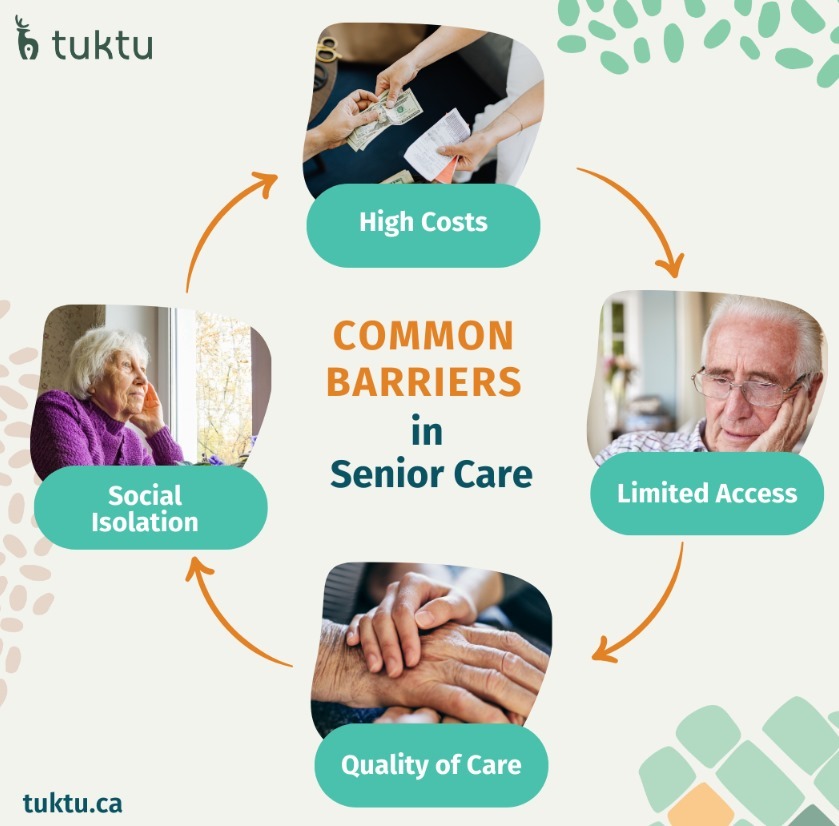As Canada and the world grapple with an aging population and a growing caregiver shortage, the need to transform the care industry has never been more urgent. By 2050, nearly 25% of Canada’s population will be over 65 years old, creating unprecedented demand for affordable, accessible, and personalized care services. Yet, the current system remains inflexible, expensive, and ill-equipped to meet these challenges.
“Traditional care models are not just outdated—they are unsustainable,” says Rustam Sengupta, founder of Tuktu Care, an innovative platform blending AI and community-driven care. “The future of care needs to be smarter, more efficient, and deeply rooted in human connection.”
A System Under Strain
The challenges in Canada’s care sector mirror a global crisis. According to the World Economic Forum’s 2024 report on the care economy, most care providers operate using outdated, inefficient methods. Families struggle with the high cost of care, rigid service structures, and a lack of professional caregivers.
Adding to these challenges is the epidemic of loneliness. The U.S. Surgeon General’s Advisory highlights that loneliness and social isolation significantly increase the risk of dementia, heart disease, and stroke. In Canada, nearly one in five seniors reports feeling lonely, a statistic with profound mental and physical health implications.
Take 79-year-old Margaret from Vancouver, for example. After losing her husband, she found herself isolated and struggling to maintain her home. Traditional care options were unaffordable, and the idea of moving into assisted living was overwhelming. “I felt invisible,” she says. “It was like the system forgot people like me.”
Margaret’s story is not unique. For millions of seniors like her, the current care infrastructure is failing.
A New Vision for Care
What if there was a way to make care more accessible, affordable, and tailored to individual needs? Tuktu Care is doing just that, combining the best of human compassion with the efficiency of artificial intelligence (AI).
At the heart of Tuktu’s approach is AI technology that acts as a care navigator for individuals and families. This innovation is already showing promise in transforming how care is delivered:
- Personalized Recommendations: AI systems analyze user preferences, cultural preferences, service histories, and social factors to recommend services. For example, a senior recovering from surgery can be matched with a local companion trained in post-hospitalization support who speaks the same language.
- Monitoring and Early Alerts: AI-powered platform offers check in – both in-person as well as virtual to consistently engage with senior and record data. If irregularities are detected—like missed medications or reduced movement—alerts are sent to caregivers or family members.
- Scheduling and Coordination: AI systems simplify logistics by automating scheduling, billing, and communication, freeing up caregivers to focus on what matters most: providing care.
“AI isn’t here to replace human caregivers,” says Danny Kaplan, a venture capitalist specializing in health tech. “It’s here to enhance their ability to deliver personalized, timely care at scale. This is a game-changer.”
Reducing Hospitalization Rates
Regular monitoring and proactive care, enabled by AI, can significantly reduce hospitalization rates. According to Healthcare Excellence Canada, 20% of hospital readmissions among seniors could be prevented with timely interventions. Examples include:
- Fall Prevention: Falls are a leading cause of hospitalization for seniors, costing the Canadian healthcare system over $2 billion annually. AI can identify risks—such as changes in gait—and recommend preventive actions.
- Chronic Disease Management: AI systems ensure better adherence to treatment plans for conditions like diabetes or heart disease, reducing emergency room visits by up to 30%.
- Medication Tracking: AI reminders help seniors maintain their medication schedules, preventing complications that often lead to hospital stays.
“Prevention is always more cost-effective than crisis management,” says Dr. Jennifer Lewis, a geriatrician and health policy expert. “AI-enabled care has the potential to save billions while improving quality of life.”
The Importance of Community
In addition to its AI-powered platform, Tuktu emphasizes the importance of community. Its model connects families with local companions who provide services ranging from errands and meal preparation to companionship and dementia care. This approach offers a lifeline for seniors like Margaret.
Margaret was introduced to Tuktu through a neighbor. She now has a companion, Elaine, who visits twice a week to help with cooking, cleaning, and errands. “Elaine isn’t just my helper; she’s become a friend,” says Margaret. “It’s made all the difference.”
For Elaine, a retired teacher, Tuktu has provided an opportunity to earn supplemental income while giving back to her community. “I’ve always loved helping people, and this allows me to do that in a meaningful way,” she says.
Tuktu’s services are priced at $25-$40 per hour — significantly lower than traditional agencies—making care accessible to middle- and lower-income families. Since its inception, Tuktu has facilitated over 25,000 hours of care, with zero advertising costs. Its annual revenue has grown over 400% year-over-year, demonstrating the demand for affordable, flexible, and personalized care.
Customer Stories: Proof of Impact
The Tuktu model is resonating with users across Canada. Customers highlight three key benefits of Tuktu:
- Flexibility: No contracts or minimum hours mean services are tailored to individual needs.
- Affordability: Services cost significantly less than traditional agencies.
- Trust: Companions are carefully vetted, ensuring safety and reliability.
Families also find peace of mind knowing their loved ones are cared for in a personalized and compassionate manner. One caregiver in Calgary described how Tuktu allowed her to manage care for her elderly parents while balancing a demanding job. “The AI platform handled the logistics, and the local companions made sure my parents felt supported. It was the perfect combination.”
A Vision for the Future
Tuktu’s future vision includes expanding its AI capabilities to create a fully integrated care ecosystem:
- AI-Enhanced Health Monitoring: Wearables that track vital signs in real time, alerting families to changes.
- Proactive Care Planning: AI systems that anticipate future needs, such as mobility aids or dietary adjustments.
- Seamless Coordination: A centralized platform connecting families, companions, and healthcare providers.
“Imagine a world where no senior has to navigate care alone,” says Sengupta. “AI can act as a personal assistant, making care easier, faster, and more accessible.”
A Call to Action
As Canada faces the dual challenges of an aging population and a caregiver shortage, the time to innovate is now. Tuktu’s model offers a roadmap for the future: blending technology and community to create a care system that is compassionate, efficient, and sustainable.
“This isn’t just about technology,” says Sengupta. “It’s about rethinking care as a human right—something that should be accessible to everyone, regardless of income or geography.”
Dr. Lewis echoes this sentiment. “The next decade will define the future of care. We have the tools and the knowledge to make care affordable, accessible, and dignified for everyone. Now, it’s about execution.”
The future of care is within our grasp. But it will take bold leadership, collaboration, and investment to make it a reality. Tuktu is leading the way, but the journey has just begun.
For more information, visit www.tuktu.ca







